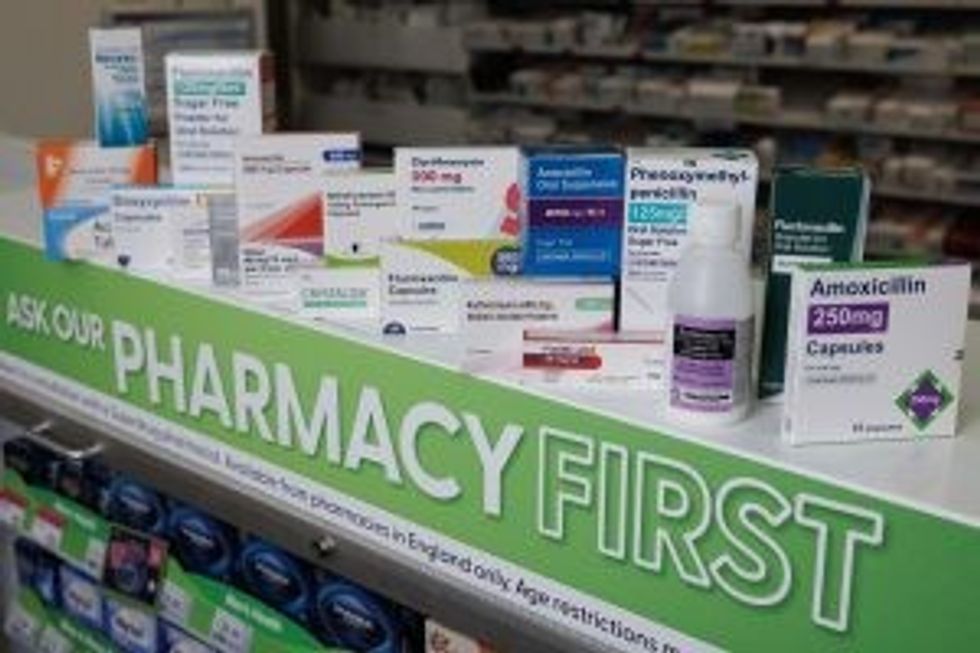A distinct lack of GP referrals in some areas has been linked to the low rate of Pharmacy First consultations. Dineshwori Longjam and Rudra Mulmule investigate…
Ensuring comprehensive healthcare services for the community necessitates collaboration between pharmacies and GP surgeries. However, several pharmacists have voiced concerns about a lack of cooperation from their local GPs in implementing the Pharmacy First (PF) service.
In a survey conducted by the National Pharmacy Association (NPA) covering 470 pharmacies across England, three-quarters of pharmacists (77 per cent) indicated that local GP practices are not appropriately referring patients to the new service.
The survey highlighted instances of patients either not being referred or being referred but found ineligible for support through Pharmacy First. Additionally, one in five NPA members (19 per cent) felt that their local GP practices were not engaging with the initiative at all.
Commenting on the issue, NPA chair Nick Kaye said: “Feedback from across our network suggests that the rollout of Pharmacy First varies considerably from area to area.
“In some locations, Local Pharmaceutical Committees and individual pharmacy practices have been successful in building awareness of and confidence in this service among local GPs. However, in too many parts of the country, our members report that GP practices are not referring patients through Pharmacy First pathways or are openly resistant to this programme,” he told Pharmacy Business.
Nevertheless, he remains optimistic that more GPs will get on board with this service “when the benefits across the country become clear.”
“Many excellent GPs are already seizing this opportunity to work hand-in-hand with us to improve access to primary care. But we want to level-up the degree of engagement at this early stage, so that patients everywhere can benefit without delay,” he added.

Let’s dive deeper into the issue
Bromley is one of the boroughs with the lowest levels of Pharmacy First referrals from GP surgeries. Speaking to Pharmacy Business, Prabjaudt Singh Channa, Director of Priory Pharmacy in Orpington, Kent, revealed that they have conducted 30 PF consultations so far, out of which 10 came from GP referrals.
“The service has a lot of potential and patients really love it, but unfortunately, pharmacies rely on referrals from GP surgeries, which I think is not how it should be,” he said.
He believes there's some hesitancy or reluctance among GPs when it comes to referring patients to PF.
“That's something that we're trying to improve and to show to our GP colleagues that they can have confidence in us,” he said, emphasising the importance of educating GPs about the service.
Moreover, he believes the service has been hampered a bit by the current IT systems available as well.
He is worried that he might not be able to meet certain thresholds, especially as the target increases.
Despite its challenges, Prabjaudt said he enjoys offering the Pharmacy First service. He remains optimistic that it will make a significant impact when it expands on a larger scale.
Graham Phillips, the owner of iHeart Pharmacy Group - a multi-award-winning community pharmacy group based in Hertfordshire and Kent, also highlighted that gaining support from GPs is crucial for the success of this scheme.
Overall, Graham found his experience with the new service to be “positive” thus far, mainly because they were already prepared to offer the service and had invested in infrastructure years ago, anticipating its introduction in 2015.
They were also able to establish good relationships and effective communications with local GPs, which provided a solid starting point. Additionally, they made extra efforts to visit local doctors and practices to explain the service and collaborate with them.
However, Graham noted that “while some practices have been very keen and very supportive, it's extremely difficult to even get others to engage.”
Lack of IT integration with GPs during the initial stages of the service also posed challenges in communicating with doctors.
“Now, as they're starting to do the IT integration, we can communicate more easily with our GP colleagues by sending them emails,” Graham said.
Nevertheless, Graham noted that they are receiving few referrals through the formal GPCS pathway, which is considered the ideal route. Instead, they are getting lots of informal referrals, and this situation potentially arises when patients are directed to see a pharmacist by a doctor or a GP receptionist who may not fully understand the scheme's criteria.
“When such patients arrive at the pharmacy, and if the pharmacy is unable to assist them, they may vent their frustration towards the pharmacy team,” he said.
Graham expressed great disappointment with the Pharmacy First advertising campaign, going as far as labeling it the worst campaign. He believes the NHS didn't allocate enough funds towards it.
Despite facing numerous challenges in implementing the service, Graham remains highly optimistic, as he stated “once the Pharmacy First service scales up, it will become huge.”
Some pharmacists, who do not wish to be named, have also told Pharmacy Business that they are not receiving Pharmacy First referrals from their local GPs.
What GPs have to say?
Meanwhile, GPs have voiced concerns that the rapid implementation of this scheme has compelled them to depend on inadequate IT infrastructure, adding further strain to their profession.
Despite these challenges, GPC England, the representative body for GPs in England, has shown willingness to work with the NPA to optimize the potential of this scheme.
“Community pharmacists and GPs want to work together to ensure patients receive safe and effective care,” Dr Julius Parker, deputy chair of GPC England, told Pharmacy Business.
“Rather than a reluctance to engage with Pharmacy First, we are aware of GPs raising concerns that this scheme is being rolled out too quickly, and is relying on inadequate IT infrastructure which is ultimately increasing the burden on our profession. This is putting further pressure on a system already close to breaking point.
“GPs, pharmacists and patients all want the same thing; we want patients to be able to receive quick and easy care, in a practice that is local to them, which is well-staffed, resourced, and safe. We look forward to engaging with the NPA to better understand their concerns and better maximise the potential of this scheme,” she added.
Strong patient demand for the service
Interestingly, there appears to be a strong patient confidence in self-referring for each of the seven Pharmacy First conditions.
Data from the Company Chemists’ Association (CCA) demonstrated strong patient demand for the NHS Pharmacy First service, with CCA members alone conducting over 90,000 PF consultations within the initial two-month period.
Approximately 73 per cent of all consultations involved patients attending by themselves. Only one-fifth of all CCA member PF consultation referrals originated from a GP surgery, and 6% of referrals were made via NHS111.
The Association underscored the urgent need of ensuring that these referral routes function optimally, enabling all patients in need to access care for any of the seven conditions.
The CCA survey also revealed that over 90 per cent of eligible patients received the necessary care through Pharmacy First, without requiring further referral. This demonstrates that in the majority of cases, community pharmacies can serve as the primary point of contact for addressing these common conditions.

Suggestions for maximizing Pharmacy First potential
Commenting on the low GP referrals for Pharmacy First service, Jay Badenhorst, PDA Director of Pharmacy, remarked: “It's really unfortunate that the two professions that are supposed to look after the patients when it comes to acute care can't work closer together to ensure that the patients are being seen when they access it.”
“I think there's a very good opportunity for the two to actually work together to meet the needs of patients seeking care.”
Further, he stressed that it’s important to look at patient pathways and identify where they are seeking to address their health needs and be able to see them at that point.
“The Pharmacy First scheme was launched as a walk-in service. So, I think there's also a lot to be done by the government, potentially the NHS, to help and guide patients to the most appropriate place for the first time,” Badenhorst said.
“We may just need to shift channels and reprogram patients to visit pharmacies first,” he added.
The CCA has urged policymakers to provide targeted support for GPs to enable them to refer more patients to Pharmacy First and reduce pressure on them.
“Whilst early signs are promising, we need GPs to be given targeted support to refer more patients into Pharmacy First and further high-quality and targeted engagement campaigns to raise wider public awareness,” said CCA chief executive Malcolm Harrison.
“Most importantly, the pharmacy sector needs a commitment from policymakers to fund Pharmacy First beyond March 2025. This needs to be accompanied by a package of measures to address historic underfunding for the sector and action to ensure patients can continue to access the prescription medicines they need,” he added.
The government under Rishi Sunak aims to release 10 million GP appointments by next winter through the expanded Pharmacy First service. However, CCA modeling shows that a fully funded and ambitious Pharmacy First service in England could free up over 30 million GP appointments annually.












